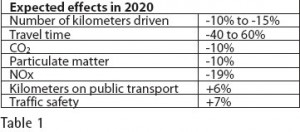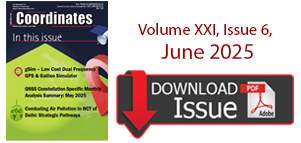| LBS | |
Being under watch
All cars in the Netherlands will be equipped with an OBU logging all movements. At the end of the month the registered keeper of the car will be invoiced for the usage of the infrastructure. That’s the plan of the government and the implementation beginning in 2012 should be finalized in 2017. Does this open the door for a continuous monitoring of citizens? |
|
 |
|
|||||
The Netherlands are a small country in the North West part of Europe with a high density of population. The area of only 41.000 km² is used by 16 Mio. Inhabitants, resulting into 400 inhabitants per km². There is an excellent infrastructure with 2.300 km of motorways and 137.000 km of roads in total complemented by a network of railways and bicycle tracks. The roads are used by 8 Mio. cars and 140.000 heavy goods vehicles. Although the motorways offer up to 6 lanes per direction, during peak time the roads are completely congested. The congested area is not only close to the main metropolitan areas of Amsterdam or Rotterdam like Paris in France or London in the UK but covers nearly the complete country; thus a distance of 100 km only on motorways typically requires 3 hours for driving with an average speed of 33k/h.
Already in 2004 a Mobility Memorandum was agreed as the congestion ranked high on the political agenda and in addition also the climate changes and CO2 emission played an important role. The Netherlands Minister of Transport, Mrs. Karla Peijs installed a platform “alternative payment for mobility” with the involvement of directors of social organizations and representatives from the private sector. One year later the platform recommended in the Memorandum Road Pricing the main components for construction, utilization and pricing. In 2006 a joint fact finding with social organizations and government agencies was initiated and complemented by a market survey on system costs. Again one year later under the government of Mr. Balkenede, the government opted for the introduction of road pricing which led in 2008 to the start of the certification and tendering process. In the same year, the legislative proposal was accepted by the council of states. In the last year 2009, the Road Pricing Proposal was presented to the Lower House of Parliament. At the same time the market consultation began and a number of mobility projects were issued in parallel.
The kilometer pricing was based on the principles presented below. All fixed vehicle taxes both for the purchase and the use of the cars should be eliminated, instead a variable fee depending on the kilometers driven should be introduced in which the charge depends on the car used. In order to allow a control and management of the traffic, the fee should be dependent on time of day and type of route driven. Thus opposed to a tax on gasoline driving on high frequently used roads would be more expensive than on a standard road and even more expensive during peak time. The fee should be applied on all roads in the Netherlands and be applicable to all vehicles. To reflect the environmental requirements, the cars should be classified largely according to their CO2 emission. As there is no chance to install toll portals on all roads for all segments, the only feasible technology for this project is to use GPS as the dominating meter to calculate the trip distance. In order to allow a high privacy, a smart OBU would be required which can calculate the fees per trip and will only transmit aggregated fees but no individual trip data nor the actual position and heading of the car in real time. One important factor was that there would be not be any tendering process to select one service provider collecting all fees but that this should be achieved in a fair open competitive market. Thus in principle every company would be allowed to operate as a service provider. However to ensure that the fees will be collected and transferred with high reliability and quality, a certification of the service provider and appointment by the ministry would be key to become a service provider.
The next step is now to implement the legislation during the run of 2010. In this year all (parallel) mobility projects should become operational. The set up for the certification should be defined and the tendering contracts issued. Most important the definitive go / nogo decision has to be taken and based on this the further structuring of the organization and the systems could be initiated. Unfortunately in February this year the government resigned for other reasons and the project will be on hold till the election of the next government in May 2010. In case of a positive decision a large scale operational test will start in 2011 with 60.000 cars as a preparation for the introduction of road pricing for heavy goods vehicles in 2012. At the same time the introduction of road pricing for passenger cars will start and finally in 2018 the fixed car taxes should have been completely phased out and the road pricing should be fully set up and implemented.
Looking to the expected positive results to the environment, society and the Individual however the new government will have difficult times not to proceed with the project. The Table 1 shows the overall expected positive effects although the overall number of cars will have been increased by 2 to 3% by that time:
In order to convince the voter that the project will not lead into any disadvantages, the ministry and the minister have given three guarantees in the beginning of the project:
In average nobody will pay more
The fees for the usage of roads will not be charged in addition or be higher than as of today but just be in total a replacement of the existing fixed taxes on purchase and use of cars. On an individual base however, somebody who uses his car only occasionally should have much less costs with the new system than with the existing taxes and somebody who drives regularly high frequently roads during peak hours will have more costs than as of today.
Ceiling for operation costs
All service providers offering to collect the traffic fees have to accept that they will get at most 5% of the collected taxes as handling fee. The administration costs in other countries are ways above and typically in the range of 10 to 15%. However service providers today do not serve such a huge market and everybody is looking to scaling effects to offer a profitable service.
NXP and IBM announce results of landmark Road Pricing TrialNetherlands trial demonstrates how advanced road pricing technology can incentivize drivers to change their behavior and reduce traffic congestion NXP Semiconductors and IBM announced the final results of a landmark road pricing trial conducted in the Netherlands, which demonstrated that with the help of technology, drivers can be motivated to change their driving behavior, reducing traffic congestion and contributing to a greener environment. The six month road pricing trial, conducted in the city of Eindhoven, was designed to provide the Dutch government with insights to address the challenge of traffic congestion in the Netherlands. The test was overwhelmingly successful, with 70 percent of drivers changing their behavior to avoid rush-hour travel when presented with the right incentives, demonstrating that road pricing systems can have a positive effect on driving habits and help alleviate traffic. Key findings of the trial included: 70 percent of drivers improved their driving behavior by avoiding rush-hour traffic and using highways instead of local roads. On average, these drivers in the trial saw an improvement of more than 16 percent in average cost per kilometer. A clear system of incentives is critical to changing driving behavior. Instant feedback provided via an On-Board Unit display on the price of the road chosen and total charges for the trip is essential to maximizing the change in behavior. The Netherlands Road Pricing Trial in Context The Netherlands will be introducing a new road-use charge starting in 2012 for trucks and lorries, and 2013 for passenger cars. The new road pricing system – Paying differently for mobility (Anders Betalen voor Mobiliteit) – is expected to be up and running nationwide by 2016. Many EU countries are now in the process of exploring road pricing programs as one of the measures to reduce congestion and CO2 emissions. In the Netherlands, once fully implemented, the Price per Kilometer (De kilometerprijs) system is expected to achieve the following benefits. (1) A 58 percent reduction in delays caused by traffic jams; A 15 percent reduction in the total number of kilometers driven annually; A 10 percent reduction in CO2 emissions; A 6 percent increase in total passenger kilometers via public transportation; More than 50 percent of Dutch households will pay less than they do currently for the motor vehicle tax and vehicle purchase tax. www.ibm.com www.nxp.com |
Privacy will be respected
Every service provider has to offer a smart OBU in which all the individual calculation of the trips will be accomplished. Only aggregated fees will be transmitted to the service provider preventing the usage of real time position data.
In the following only the privacy aspects will be further analyzed.
As every service provider will have to offer to its clients a smart OBU, there is no necessity to transfer trip data outside of the OBU. Only aggregated data will be transmitted to and processed by the service provider. However in case of dispute the registered keeper of the car will have access to check his individual trip data. So there will be a method to retrieve the trip data out of the OBU and quite some efforts have to be implemented to prevent misuse. However as it is today not clear which information will be shown on the invoice and how detailed aggregated still might be, it is too early to confirm that the privacy will be assured in any case. In addition the judiciary will also have the right to access the data without the support by the registered car keeper. In Germany with a similar system in place only for heavy good vehicles, a special law was issued to prevent the usage of the individual trip data for any other reason outside of road charging. In the past year there was a serial murderer active on highways and the police could trace down the number of suspects to truck drivers. They were quite sure to identify the murderer by analyzing the data collected for road charging and still available about the exact movements of trucks. However due to the legal framework, the (mis-) use of this data was rejected by court even in case it would help to prevent further murders. But this level of privacy will not be replicated in the Netherlands and the balance between trust and control will be more on the control side. In addition the service provider will be able to offer value added services, which typically require knowledge on location and heading in real time. Thus it is planned that the service provider also might make use of thin OBUs which transfer all position data and information about driven distance in real time. In this case, the registered car keeper has explicitly give his prior written approval for the processing of individual trip data, however it is still open how this might be communicated to the driver of the car. Lease companies might consider this as a excellent idea to collect further fees by charging fees per kilometer for which the speed of the car was higher than the legal maximum speed for this leg of the road. The service provider is legally bound in the usage and processing of the data by the Personal Data Protection Act effective since 01- 09-2001. During the certification process the proper implementation and correct usage might be checked and validated.
Looking to the initial discussion on big brother one can conclude that in principle the guarantee of the minister on privacy can be achieved as
• Only aggregated data is transferred
• Access to trip data in OBU only by registered car keeper
• Privacy law in place.
However as of today the processes and procedures are not know about potential threats like
• Details of aggregated invoice might provide too much information
• Access to trip data available in which cases of criminal activities under which conditions
• Requirements and control for processing of location and trip in real time
• Communication to driver of the car about monitoring his individual trips and not only to the registered keeper of the car
The privacy will be assured on three complementary levels. On the first level, the privacy is secured with technical measures; e.g. the OBU will protect the individual trip data against unauthorized access like a safe. On the second level the regulation will provide additional confidence requiring obeying the law on Personal Data Protection Act like a guard in the entrance to the safe. The last level relies on check and validation by independent highly trustworthy entities, accredited and appointed by the ministry, like the TÜV organization to certify conformance with all requirements for the products with the initial type approval and within the service providers based on periodic certifications. Then big brother will not be watching you.
My Coordinates |
EDITORIAL |
|
Conference |
Where navigation meets the world, NRSC User Interaction Workshop 2010 |
|
News |
INDUSTRY | GPS | GALILEO UPDATE | LBS | GIS | REMOTE SENSING |
|
Mark your calendar |
APRIL 2010 TO NOVEMBER 2010 |












 (No Ratings Yet)
(No Ratings Yet)






Leave your response!